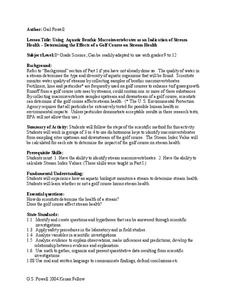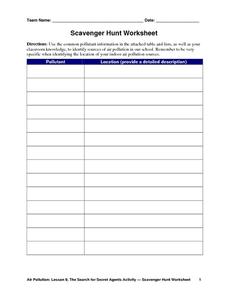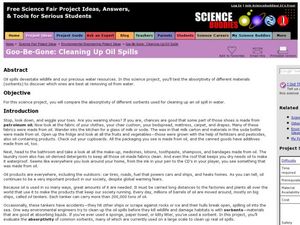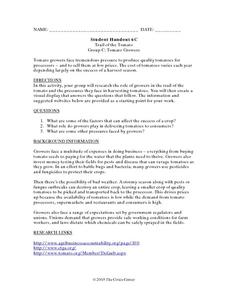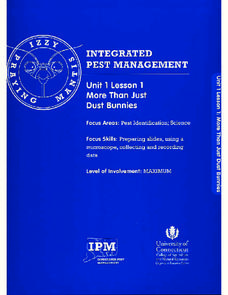Teach Engineering
Introduction to Environmental Engineering
A series on environmental engineering introduces the class to issues that environmental engineers work to solve. This first instructional activity focuses on air and land issues, and looks at ways to reduce pollution.
Kenan Fellows
Determining the Effects of a Golf Course on Stream Health
Do golf courses affect the water organisms in nearby streams and ponds? Small groups collect samples of water upstream and downstream from a golf course and analyze the macroinvertebrates found and the stream index values of the two...
Florida Department of Environmental Protection
Build Your Own Aquifer
Ever wondered how an aquifer works? Introduce your class to the amazing way many people get water by exploring how underground aquifers work. Two fun hands-on activities are used to help kids understand what an aquifer is, how it works,...
Curated OER
Scavenger Hunt Worksheet
Exactly how environmentally friendly is your school? From the air fresheners in the bathrooms to the cleaning solvents used in the classrooms, young conservationists search the school grounds for sources of air pollution in...
Pennsylvania State University
Learn, Protect, and Promote Water
A hands-on activity helps learners explore the water cycle. After discussing how they use water, classes discuss water pollution and then move into a simulation where 20 pupils move through the water cycle based on description cards.
Curated OER
Midnight Dumpers
Students explain how pollution affects ground water. They participate in a simulation to discover the location of an illegal dump. Students explore the monetary benefits, risk and environmental concerns are factors in business decisions.
Curated OER
Cleaning up an oil spill
Small groups complete a science project involving cleaning up an oil spill. In this experiment, pupils use 4 different sorbents to discover which one absorbs the most oil. Afterward, they make a data table.
Curated OER
DNA: Expressions in Agriculture
What is DNA extraction, and can you make a living doing it? Yes, if you are in a biotechnology field. Kids learn about DNA extraction, GMOs, and biotechnology careers. They then watch videos and complete activities to understand the use...
Curated OER
What is Biotechnology?
Young consumers explore the concept of biotechnology as it pertains to the foods they eat, economics, and agriculture. They watch several videos, explore a website, complete worksheets, and engage in class discussion. Son they'll know...
Curated OER
Water Filtration
As an example of nature's water filtering system, young ecologists conduct an experiment in the lab. They construct a funnel out of a plastic bottle, fill it with specified layers of materials that simulate layers of soil, then run muddy...
Curated OER
Trail of the Tomato Growers
Economic pressures to produce and harvest in order to meet consumer needs is a very real issue. In small groups, the class uses three guiding questions to research the pressures on tomato growers to harvest at a level that meets the...
Curated OER
Effective Persuasion: Developing Persuasive Arguments
Use research to strengthen a persuasive argument. Examples of ethos, logs, and pathos are presented, and learners discuss how using research can improve one's argument. Pair this presentation with an example persuasive piece to point out...
Prince William Network
The Incredible Journey
Divide your school gym into breeding grounds and non-breeding grounds so that your zoologists can play a game simulating the seasonal migration of shorebirds. Players pick one of the included game cards and follow its directions, which...
US Environmental Protection Agency
Non-Point Source Pollution
Investigate the different types of pollution that storm drain runoff carries into oceans, lakes, rivers, and streams with this class demonstration. Using an aquarium and an assortment of everyday items that contaminants like motor oil,...
National Wildlife Federation
Habitat Web
Young scientists weave together an understanding of ecosystems with this fun collaborative activity. Taking on the roles of different living and non-living elements of specific habitats, learners use a ball of yarn to create the web of...
Scholastic
Drones Take Off
Ever wonder what drones are doing high above us in the sky? This article gives your class an insight to what those robots in the sky are doing. After reading an article on drone technology, pupils are prompted to respond to a variety of...
Florida Department of Environmental Protection
Water's Journey Expedition
Step into a scientist's shoes to go online and discover the Florida Springs Expedition, and participate in two activities focusing on how humans impact the environment. The first activity asks scholars to summarize the six dispatches at...
University of Connecticut
More Than Just Dust Bunnies
Teenagers will never complain about cleaning their rooms after this activity. In the first lesson of a four-part series, budding scientists collect samples of dust, chalk, and other particulates from various areas of the classroom. They...
National Institute of Open Schooling
Nomenclature and General Principles
Carbon, the base for all organic compounds, exists in nature in its purest form as graphite or diamonds. The 25th lesson in a series of 36 teaches pupils the nomenclature of organic compounds. Learners read about how to use the IUPAC...
National Institute of Open Schooling
Compounds of Carbon Containing Halogens (Haloalkanes and Haloarenes)
Halogens comes from a Greek word which translates to make salt. Lesson 27 in the series of 36 teaches pupils about halogens. Pupils read, discuss, and answer questions in order to learn about haloalkanes and haloarenes. From defining...
Global Oneness Project
Rethinking the Fabrics We Wear
What are fibersheds and what what do they have to do with environmental protections? A photo essay and audio recordings about Mimi Luebbermann, and her sheep, cause consumers to reflect on how their clothing choices can support local...
Curated OER
Reading Comprehension- Informational Passages "Pollution"
Practice reading comprehension through this pollution worksheet, which has learners read an informational passage on various aspects of environmental harm. Key terms are in bold, and are used on the next page in the comprehension...
Curated OER
Organic Farming / Agriculture
Want an organic farming resource packed with experiments, background information, science fair projects, and topics of interest for further research? Here it is. Young environmental scientists can explore concepts involved in organic...
Curated OER
Manduca
Students investigate the basic survival needs of both hornworms and humans. They compare and contrast the them by making a class list.
Other popular searches
- Pesticides Food
- Harmful Pesticides
- Pesticides and Their Harm
- Pollution Pesticides
- Comparing Pesticides
- Pesticides for the Farm
- Agriculture Pesticides
- Pesticides and the Danger
- Synthetic Pesticides
- Pesticides and Insect
- Chemical Elements Pesticides
- Herbicides and Pesticides



